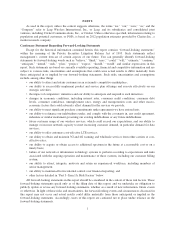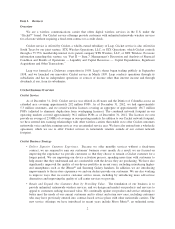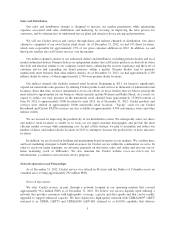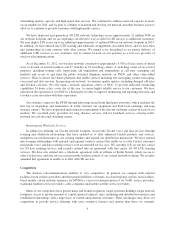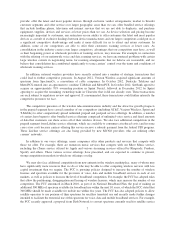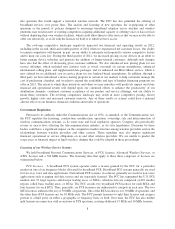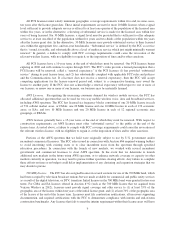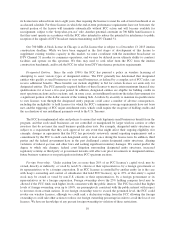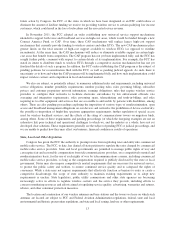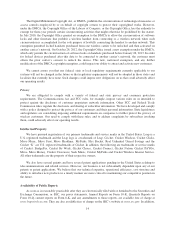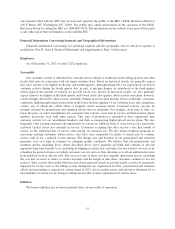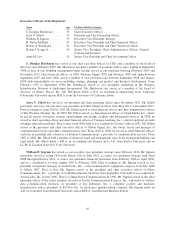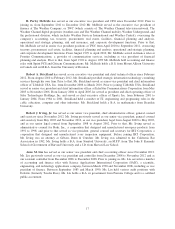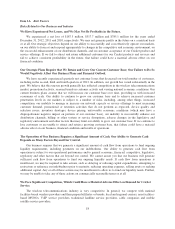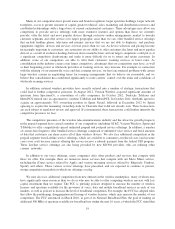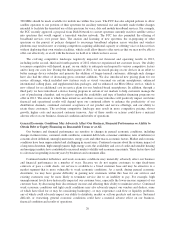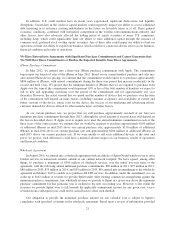Cricket Wireless 2012 Annual Report Download - page 25
Download and view the complete annual report
Please find page 25 of the 2012 Cricket Wireless annual report below. You can navigate through the pages in the report by either clicking on the pages listed below, or by using the keyword search tool below to find specific information within the annual report.Transfer and Assignment. The Communications Act and FCC rules require the FCC’s prior approval of
the assignment or transfer of control of a commercial wireless license, with limited exceptions. The FCC may
prohibit or impose conditions on assignments and transfers of control of licenses. Non-controlling membership
interests in an entity that holds a wireless license generally may be bought or sold without FCC approval. The
FCC engages in a case-by-case review of transactions that involve the consolidation of spectrum licenses or
leases and applies a spectrum “screen” in examining such transactions. Although we cannot assure you that the
FCC will approve or act in a timely fashion upon any pending or future requests for approval of assignment or
transfer of control applications that we file, in general we believe the FCC will approve or grant such requests or
applications in due course. Because an FCC license is necessary to lawfully provide wireless service, if the FCC
were to disapprove any such filing, our business plans would be adversely affected.
FCC Regulation Generally
The FCC has a number of other complex requirements and proceedings that affect our operations and that
could increase our costs or diminish our revenues. For example, the FCC requires wireless carriers to make
available emergency 911, or E911, services, including enhanced E911 services that provide the caller’s telephone
number and detailed location information to emergency responders, as well as a requirement that E911 services
be made available to users with speech or hearing disabilities. Our obligations to implement these services occur
on a market-by-market basis as emergency service providers request the implementation of enhanced E911
services in their locales. Absent a waiver, a failure to comply with these requirements could subject us to
significant penalties. Furthermore, the FCC has initiated a comprehensive re-examination of E911 location
accuracy and reliability requirements. In connection with this re-examination, the FCC issued an order requiring
wireless carriers to satisfy E911 location and reliability standards at a geographical level defined by the coverage
area of a Public Safety Answering Point, or PSAP, and has indicated that further action may be taken in future
proceedings to establish more stringent, uniform location accuracy requirements across technologies, and to
promote continuing development of technologies that might enable carriers to provide public safety with better
information for locating persons in the event of an emergency. We cannot predict whether or how such actions
will affect our business, financial condition or results of operations.
FCC rules also require that local exchange carriers and most commercial mobile radio service providers,
including providers like Cricket, allow customers to change service providers without changing telephone
numbers. For wireless service providers, this mandate is referred to as wireless local number portability. The
FCC also has adopted rules governing the porting of wireline telephone numbers to wireless carriers.
The FCC has the authority to order interconnection between commercial mobile radio service operators and
incumbent local exchange carriers, and FCC rules provide that all local exchange carriers must enter into
compensation arrangements with commercial mobile radio service carriers for the exchange of local traffic,
whereby each carrier compensates the other for terminating local traffic originating on the other carrier’s
network. As a commercial mobile radio services provider, we are required to pay compensation to a wireline
local exchange carrier that transports and terminates a local call that originated on our network. Similarly, we are
entitled to receive compensation when we transport and terminate a local call that originated on a wireline local
exchange network. We negotiate interconnection arrangements for our network with major incumbent local
exchange carriers and other independent telephone companies. If an agreement cannot be reached, under certain
circumstances, parties to interconnection negotiations can submit outstanding disputes to state authorities for
arbitration. Negotiated interconnection agreements are subject to state approval. The FCC’s interconnection rules
and rulings, as well as state arbitration proceedings, directly impact the nature and costs of facilities necessary for
the interconnection of our network with other wireless telecommunications networks. They also determine the
amount we receive for terminating calls originating on the networks of local exchange carriers and other
telecommunications carriers. The FCC in recent years adopted comprehensive changes to its intercarrier
compensation system, which include, among other things, the transition of all types of traffic to a bill-and-keep
regime over a multi-year period, as well as a mechanism to offset the resulting revenue losses for incumbents.
For wireless carriers, the FCC made the transition immediately, and adopted bill-and-keep as the default
11


